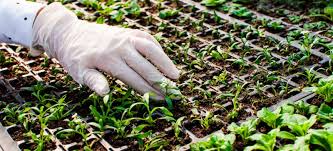Biotechnology is the use of living organisms for developing advanced products with the help of genetic modulation and technology. Bioengineered food has gained significant momentum as a result of the growing population and the rising demand for food and beverage items to suffice to the needs of these people.
Bioengineering technology has been used in the farming industry as well for yielding high amount of agricultural commodities such as fruits, vegetables, grains, and others. Bioengineered food consists of various genetic materials that is modified via certain laboratory techniques and these items are those that cannot be found in nature. Some of the commonly available bioengineered food products include sugarbeet, eggplant, squash, papaya, soybean, cotton, salmon, canola, potato, apple, pineapple, alfalfa, and others.
Bioengineered food products are considered to be growing at a rapid pace on account of the increasing population and the rising consumption of conventional food. The fast food culture has been adopted since the past two decades and also generates high revenues owing to its convenience and delicious taste. In agricultural products, DNA of the plants has been modified with the help of bioengineering techniques. In bioengineering products, a single trait in an organism is manipulated, added, or deleted in order to obtain a desired trait. On the contrary, factors such as the increasing demand for organic food may cause hindrance to the overall growth of this market. Nevertheless, on account of the increasing cases of obesity, heart diseases and other lifestyle related diseases, there has been a huge wave of consumer shift from fast food towards healthy and organic food products. Therefore, the rising consumer inclination towards nutritional food products is likely to augment the growth of the global bioengineered food market.
Promotion of Bioengineered Food Products led to Decline in use of Pesticides on Crops
The adoption of bioengineered food has also led to a worldwide reduction in the use of herbicides and pesticides for protecting plants and agricultural products. As per the National Institute of Health, the beneficial impacts of pesticides are not yet known but it is for a fact that their uses on crops and the consumption by humans has led to several health drawbacks such as diabetes, neurological disease, malignancy, and others. Thus, bioengineered and GMO branded products are gaining significant reducing the use of pesticides on crop yielding and plantation. Such factors are likely to bode well for the growth of the global bioengineered food market in the coming years.
Bioengineered food products are already out for sale on the market and are gaining significant popularity. This include fruits and vegetables as well as canola, soy, and other grains, However, some laws are imposed in order to ensure its authenticity for the safety of the consumers. As per the Department of Agriculture, United States, any food products or ingredients that complies with the definition of bioengineered products must include a disclosure in its label or packaging. However, some refined ingredients such as oils and sugars or meat, egg, or poultry products need not require adding a bioengineered food disclosure w.e.f. January 1st, 2022. Additionally, small manufacturers in the food industry having presence only in the local and regional market as well as food served in food trucks, restaurants, airplanes, and other retail establishments may or may not voluntarily provide a bioengineered food disclosure as per their convenience.
Get a glimpse of the in-depth analysis through our Report Brochure
In June 2017, the Dow Chemical Company launched ‘Enlist Corn”, for fighting weed growth in agricultural crops that are adamant on the usual herbicide glyphosate. It availability in the United States generated high consumer demand and thus, expanded the customer base in North American region as well as other parts of the world. Such efforts taken by players of the global bioengineered food market are likely to aid in expansion of this market in the long run. Some other player functioning in this market include KWS SAAT SE & Co. KGaA, Sakata, The Dow Chemical Company, BASF SE, Bayer AG, Groupe Limagrain, DuPont de Nemours Inc., Syngenta AG, and others.



































